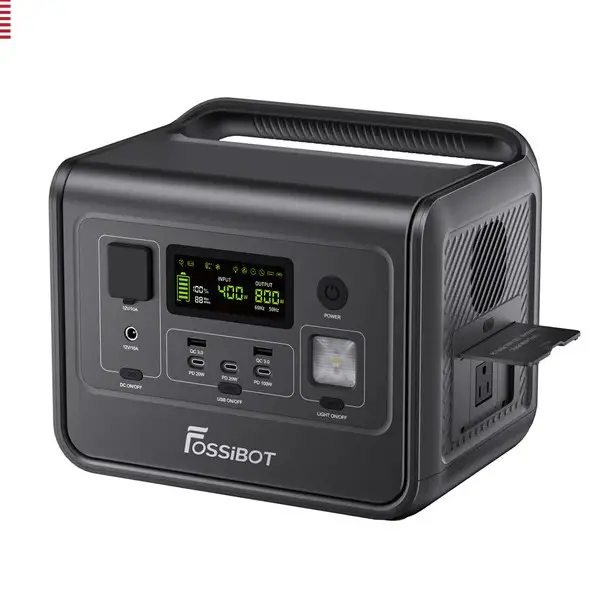

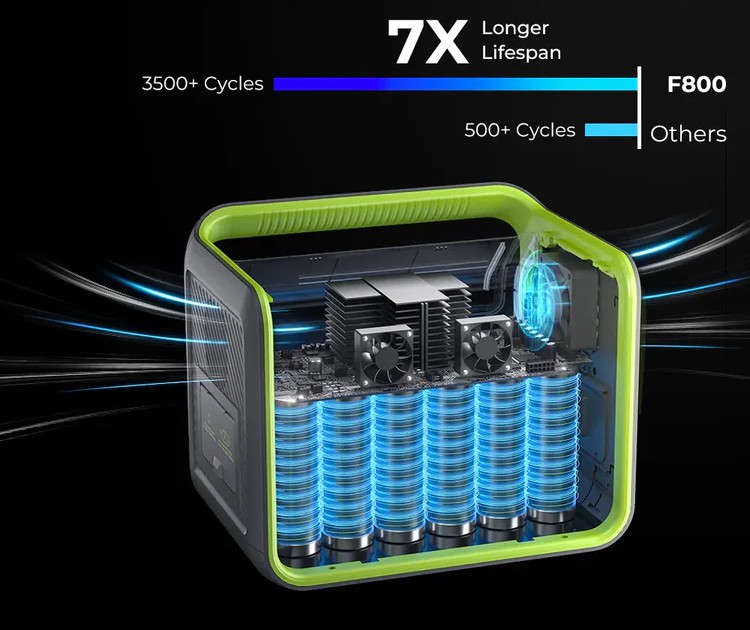
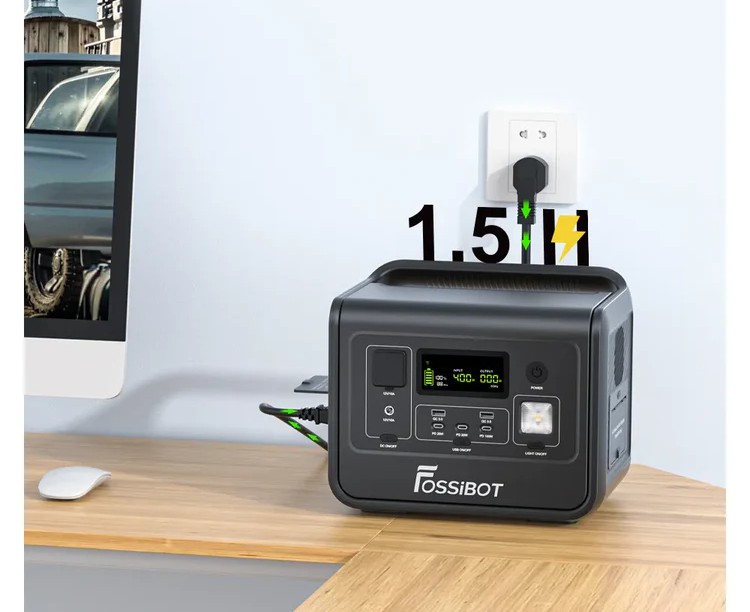
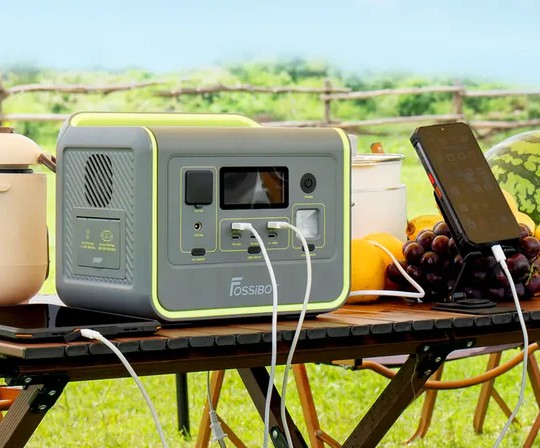
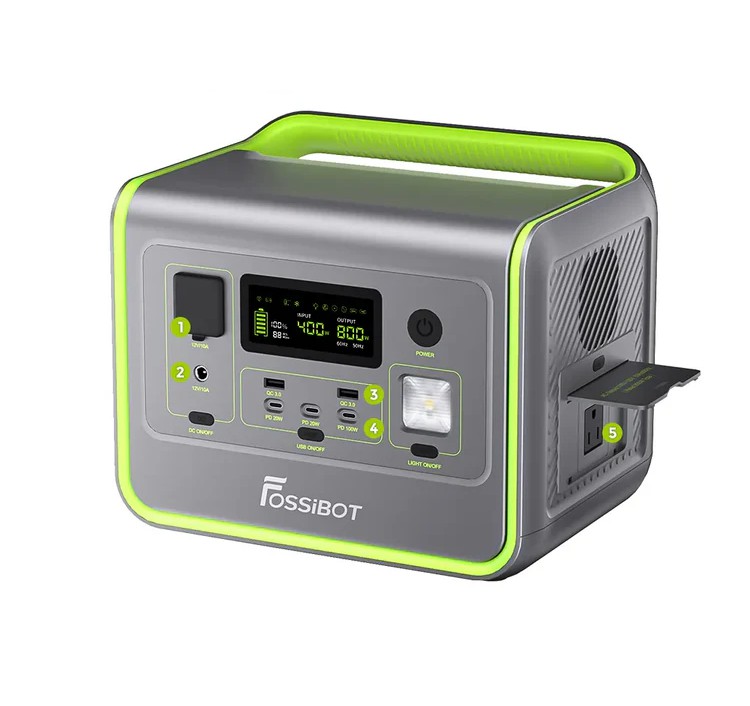
The FOSSiBOT F800 is a portable power station that can provide electricity in situations where access to mains power is limited. This could be useful for camping trips, emergencies, or powering devices outdoors.
The F800 features a Lithium Iron Phosphate (LiFePO4) battery with a capacity of 512Wh. This battery type is known for offering a longer lifespan compared to some other options on the market. The unit itself weighs 14.33 pounds (6.5 kg) and measures 10.9 x 8.2 x 9.1 inches (276 x 209 x 230 mm). These specifications are important to consider for users who prioritize portability.
The F800 offers multiple ways to recharge the battery. It supports AC charging with a maximum input of 400W, which can provide a full charge in approximately 1.5 hours. Solar charging is also an option, with a maximum input of 200W and a corresponding charging time of around 2.5 hours.
Additionally, a 12V car charger is included, allowing for charging from a car's outlet in 4.5 hours. Notably, the F800 allows for combining AC and solar charging for potentially faster recharge times (up to 1.2 hours with a combined maximum input of 600W).
When it comes to powering devices, the F800 features a pure sine wave inverter with a total output of 800W. This inverter type ensures compatibility with a wider range of devices, including those considered sensitive electronics. The unit can also handle brief surges in power of up to 1600W.
The F800 provides various options for powering your devices. It includes a single AC outlet suitable for larger appliances. It also features a selection of USB ports, including a 100W PD USB-C port, two 20W PD USB-C ports, and two 18W QC3.0 USB-A ports. This variety of ports caters to the charging needs of different devices.
For illumination purposes, the F800 comes equipped with a built-in 1W LED light. It also incorporates a Battery Management System (BMS) with several monitoring features, including load, voltage, and temperature. These features may contribute to the overall safety and longevity of the device.
The package includes the FOSSiBOT F800 unit itself, an AC charging cable, a solar charging cable, and a user manual. The manufacturer provides a 24-month warranty for the product. The full specificationsof the F800 portable power station is contained in the table below.
| Launch This refers to the date when this device was officially introduced into the market. | 2021, March / 2021 May |
| Brand / Model These are key identifiers that indicate the manufacturer or company that produces this smartphone, and the specific model of the phone. | FOSSiBOT / F800 |
| Dimensions / Weight: This refers to the physical size and weight of the device, measured in millimeter (mm) and grams (g) respectively. | 276 x 209 x 230 mm / 14.33lb (6.5 kg) |
| Temperature The temperature in a mobile power station or power bank refers to the level of thermal energy present within the device during its operation. It's typically measured in degrees Celsius (°C) or Fahrenheit (°F) and indicates how hot or cold the internal components of the power bank are during usage. | -4-104℉ (-20-40℃) |
| Battery Type In portable power stations, battery type refers to the specific chemical technology used to store electrical energy. This choice significantly impacts factors like the weight, lifespan, safety, and charging speed of the station | LiFePO4 (Lithium Iron Phosphate) |
| Battery Capacity Battery capacity in a portable power station refers to the total amount of electrical energy it can store, measured in watt-hours (Wh). It essentially tells you how long the station can power your devices. | 512Wh (25.6V, 20Ah) |
| Lifecycle This indicates the number of times you can completely discharge and recharge the battery (one cycle) before it loses 20% of its original capacity. In simpler terms, this tells you how many times you can use and recharge the station before it becomes noticeably less powerful. | Not stated |
| Shelf-Life This refers to how long the battery can maintain its charge when not in use. Over time, even if the station isn't being used, the battery will slowly lose its charge. This specification tells you how often you need to recharge the station even if it's just sitting in storage or on the shelf. | Recharge to 80% Every 3-6 Months |
| Management System This refers to all measures put in place to ensure the optimal performance and safety of your Portable Power Station. |
BMS Chip protected against - Load / Voltage Monitoring - Charging Monitoring - Temperature monitoring |
| Charging Type (Input Option) In portable power stations, charging type refers to the methods available to recharge the battery. |
AC Input: up 400W Solar Input: up 200W Max. Car Input: up 120W from XT60 port |
| AC Charging Time AC charging time for a portable power station refers to the time it takes to recharge the station from a standard AC wall outlet. | 1 hour 30 minutes |
| Solar Charging Time Solar charging time for a portable power station refers to the amount of time it takes to recharge the station's battery using a solar panel. | 2 hours 30 minutes |
| AC + Solar Charging Time AC + Solar Charging time refers to the time it will take when both AC wall outlet and a Solar panel is combined to recharge your Portable Power Station. | Supported: Combine 600W max |
| Car Charging Time Car charging time for a portable power station refers to the amount of time it takes to recharge the station's battery using the cigarette lighter outlet (also known as a 12V DC outlet) in your car. | 4 hours 30 minutes |
| Total Output Power This represents the maximum continuous power (measured in watts) that the portable station can deliver to your devices at any given time. It essentially tells you the total amount of power available for running your appliances simultaneously. | 800W |
| Inverter Type This refers to the type of electrical current the station generates through a process called inversion (converting DC battery power to AC power). There are two main types: Pure Sine Wave or Modified Sine Wave. | Pure Sine Wave |
| Surge Power This indicates the maximum short-term surge of power (measured in watts) that the station can handle for a brief period (usually a few milliseconds). This can be helpful for starting up devices with high initial power demands, such as motors in refrigerators or power tools. | 1,600W |
| AC Outlets These are the standard AC (alternating current) outlets that you'd use to plug in your devices with AC power cords. | 1 X AC Outlets |
| USB Ports These are the USB ports available for charging various devices using USB-C or USB-A cables. |
1 x PD100W - USB Type-C 2 x PD20W - USB Type-C 2 x (QC3.0)18W - USB Type-A |
| Cigarette Lighter Sockets This is a 12V DC (direct current) outlet similar to the cigarette lighter socket found in your car. It allows you to power 12V DC appliances, such as car chargers, portable coolers, or some lights. | No |
| LED light An LED light, in the context of a portable power station, refers to a built-in light source that uses light-emitting diodes (LEDs) for illumination. These lights are typically small, energy-efficient, and durable. | Yes; 1W |
| Box Contents This section refers to all the items, tools, accessories, and cables contained in the box. |
FOSSiBOT F800 - AC Charge Cable - Solar Charging Cable - User Manual |
| Warranty A warranty on a portable power station refers to a guarantee provided by the manufacturer that the product will be free from defects in materials and workmanship for a specified period of time. | 24 Months |
| Color Options In the context of portable power stations, "Color Option" most likely refer to the variety of colors the station itself comes in. | Black, Green |
These specifications were entered manually, hence we CANNOT guarantee 100% accuracy. Also, that your device is listed on this website DOES NOT call for reckless usage! It is crucial to exercise due diligence, as we cannot be held responsible for any damage to your device due to overconfidence in it built quality.
Leave a Reply